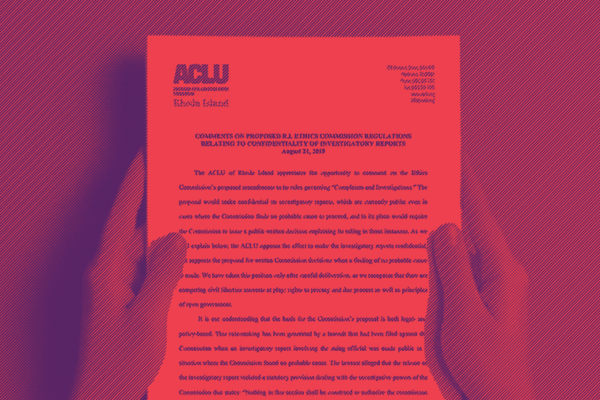The ACLU has asked the R.I. Supreme Court to overturn a Superior Court ruling that upheld the constitutionality of a problematic Providence housing ordinance that prohibits more than three “college students” from living together in certain housing in some areas of the city. In her February 2018 decision, Superior Court Judge Maureen Keough acknowledged “strong reservations concerning the effectiveness” of the ordinance and agreed it “seems nonsensical,” but ultimately ruled against the students and found the ordinance constitutional. However, in a brief filed with the Supreme Court this week, ACLU attorneys argue that the ordinance unconstitutionally “relegates anyone enrolled in college or graduate school to the status of second-class citizen within the City of Providence.”
In 2016, ACLU of RI cooperating attorneys Jeffrey L. Levy and Charles D. Blackman filed the lawsuit on behalf of the owner and tenants – four Johnson & Wales undergraduate students – of a house in the Elmhurst section of Providence. The City ordinance makes it illegal for more than three “college students” of any age or level of educational status to live together in a non-owner-occupied single family home in certain residential areas. The lawsuit argues that the ordinance is discriminatory and ineffective in its stated purpose of improving neighborhoods, and violates the plaintiffs’ rights to due process and equal protection of the law.
Some excerpts from the ACLU brief appear below:
“It is up to this Court to determine whether the City of Providence can discriminate against some residents simply because they are enrolled in an institution of higher learning, whether Rhode Islanders have a fundamental right to choose their living companions, and whether the City can enact and enforce a blatantly discriminatory ordinance merely to placate frustrated local residents, even if the ordinance itself is ‘nonsensical’ and will almost certainly be ineffective.”
“There is no reason to believe that in a neighborhood with a mix of single family homes and multi-family homes, enacting legislation that targets only the single family homes will have any appreciable impact on noise, parking, public drinking, or other problems that might sometimes be associated with student housing. The Ordinance also discriminates against Rhode Islanders solely on the basis of their decision to pursue higher education.”
“We should be smoothing the path to the pursuit of education, not erecting obstacles that will limit the housing choices available to a resident simply because she is enrolled in a course at CCRI or is a full-time undergraduate at Providence College. Instead, the City would permit four unrelated and unemployed eighteen year olds to live together in a single-family home, but should they decide to enroll in a college course, their cohabitation would immediately become illegal.”
“The Student Housing ordinance defines ‘college student’ to include both graduate students and part time students. . . [T]he Ordinance prohibits four divinity students from renting a single-family home together, or four unrelated adults who are taking part time college courses. There is absolutely no evidence that tenants in Providence are more likely to cause a disturbance merely because they are enrolled at an institution of higher learning.”
ACLU attorney Levy said today: “This case presents an important opportunity for the Supreme Court to show that Rhode Island’s Constitution reflects our values as a community. College students represent the future of our state, and we should not tolerate laws that discriminate against them or treat them as second-class citizens.”

